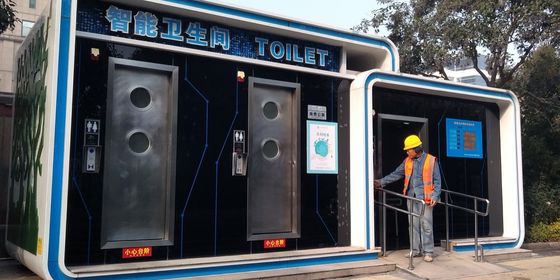We compare the different bike-sharing services available in Beijing and the wacky tactics they use to stay ahead
The week is not off to a good start for Chinese bike-sharing giant Mobike. Yesterday morning, it was reported that the company had been flagged by the National Enterprise Credit Information Publicity System as an “abnormal operation” because they could not be found at the address listed. Though company spokespeople quickly responded that Mobike has recently moved into new offices and not yet updated their contact details, the damage was done: Media (including today’s print edition of Global Times) are using the incident as a shady-sounding lead-in to report customer complaints about Mobike ranging from overcharging fees and difficulty getting deposits back.
Mobike’s rival, ofo, had its day in the limelight last week, both due to its special offer of free rides in the Beijing area during the second week of the Two Sessions and reports that its bikes were experiencing a high volume of vandalism and theft (and a few well-publicized arrests, link in Chinese), as their lack of a GPS tracking function makes them especially vulnerable compared to Mobike and other competitors. In all, as the bike-sharing arena grows bigger, so do their challenges, and companies are adding more and more features to stay competitive. TWOC has created the following guide to help you keep them all straight and highlight a few competitive strategies that these companies employ.
Here are your starters:
*Note: due to limits on our resources and patience for hair-splitting, we will only compare bikes that we’ve found in our part of eastern Beijing. We are also not advocating on behalf of any particular bike-sharing service (although our web manager, Ethan, would like it known that he really likes the public bicycles and disdains all these other private-sector upstarts). Sources include previous media reports and calls to company offices were no reports were available.
| Brand | Mobike | Mobike Lite | ofo | Bluegogo | Youon | Coolqi | Public Bicycle in Beijing | ZX Bike (Haidian District Bicycle) |
| Signature color | Orange and silver | Yellow | Dark blue | Dark blue and yellow | Lime green | Red | Cyan or highlighter green | |
| Basket? | Yes for some | Yes | No | Yes | Yes | Yes | Yes | Yes |
| Available for foreigners? | Yes | Yes | Yes | Yes | No | Yes | No | |
| Deposit | 299 RMB | 99 RMB | 99 RMB | None if you have above a “sesame credit” score of above 600 on Alipay. 200 RMB if you don’t—requires minimum 200 RMB in your account to sign up | 298 RMB | 200 RMB for legal Beijing residents (including foreigners with valid residence permit), 400 RMB for other cities’ residents; must register with official ID to use. As of December 2016, deposit can be waived for those with over 600 sesame credits using their new app | Two options: none, or 200 RMB | |
| Rate | 1 RMB per hour | .5 RMB every 30 minutes | 1 RMB per hour | .5 RMB every 30 minutes | 1 RMB per hour | .3 RMB four 30 minutes; there is a promotion sponsored by an online financing company that lets customers have their first 10 rides for free | Free for the first hour, 1 RMB per hour after that | 5 RMB per hour without deposit, 1 RMB per hour with deposit |
| Started in | Beijing, 2014 | Beijing, 2015 | Beijing, 2016 | Changzhou, Jiangsu, 2010 | Tongzhou, Beijing, 2016 | Chaoyang, Beijing, 2012 | Haidian, Beijing, 2016 | |
| Mechanics | No chain, front and back band brakes (electric) | Chain, V-brake in front, drum brake in back | Chain, V-brake in front, drum brake in back | Chain, drum brake in front, roller brake in back | Belt-drive system, drum brakes | Chain, drum brakes | Chain, V-brake in front, drum brake in back | Chain, drum brakes |
| Adjustable seat? | Some (those with basket) | Yes, but supposedly very difficult | Yes | Yes | Yes | Yes | Yes | Yes |
| Approximate weight | 26 kg | 24 kg | 16 kg | 19 kg | 16 kg | 18 kg | N/A | N/A |
| Cost to manufacture each bike | Unclear, reported in media to be 2,000 – 3,000 RMB | Unclear, reported to be several hundred RMB | 200 RMB | “Greater than Mobike Lite but less than 2,000 RMB,” said CEO Li Gang at a press conference in November | N/A | N/A | N/A | Unknown—but its bikes are recycled and not manufactured new |
| How to borrow | Open app, locate bike on map, scan QR code to unlock bike on roadside | Locate bike on your own (no GPS) and enter bike number in app to obtain password to unlock combination lock on bike | Open app, locate bike on map, scan QR code to unlock bike on roadside | Open app (or can find it on Alipay under services offered by sesame credit), locate bike on map scan QR code or enter bike number to unlock bike on roadside. For docked bikes (only available in some cities), locate bike station on app | Open app, locate bike on map, scan QR code to unlock bike on roadside | Memorize location of nearest bike station or find them on the official website, swipe subway card to unlock and return bike. There is now also an app to help you find the stations | Open app, locate bike on map, scan QR code to unlock bike on roadside | |
| Big-name investor/partner | Tencent | Didi | N/A | Alibaba | N/A | N/A | Haidian district government | |
| Coverage | Average of 100,000 bikes per city across 23 cities | Exact number unknown but estimated to be in the millions, in 33 cities as of January | 200,000 at the end of 2016 | More than 800,000 bikes can be from 210 cities total; 80 cities offer rental with QR code. Only arrived in Beijing at the end of February | 20,000 in “at least” 10 cities, according to company representatives we spoke to. Launched in Beijing outside of Tongzhou in March, also launched in Shenyang (with 5000 bikes), Hefei, and Luoyang last week | Around 55,000 bikes in all Beijing districts and counties except Mentougou | Unclear, company could not be reached to confirm, but they claimed to have recycled more than 10,000 at the end of 2016. They entered Chaoyang district last week | |
[wds id=”5″]
Their tactics:
Free rides
While ofo got all the headlines by connecting their free-rides offer to the Two Sessions, Bluegogo also offered free rides last week all around the country and announced on Friday (Chinese link) that they will continue the offer this week. Ofo has also tried out other free-ride schemes in the past, such as free rides on Mondays last December, and between 7 a.m. and 10 a.m., Monday to Friday, last week in cities other than Beijing. It was reported today in Kunming, where Mobikes are already free Fridays through Sundays, that Mobikes can be ridden for free Monday to Thursday this week between 10 a.m. and 4 p.m. While this is great for everyone who likes free stuff, one can’t help but think that it’s a race to the bottom.
Public service
Ofo has decided to make lemonade out of lemons: Sure, their relatively cheap bikes get vandalized a lot and are accused of breaking frequently due to low quality, so last week, it was reported that they’ve been offering full-time jobs as bike mechanics to those (usually) elderly, roadside bike-repairmen who are finding it harder and harder to make a living. One repairman told media (Chinese link) that ofo offered him six types of social insurance plus a housing fund. He also claimed that other bike companies made him offers, though didn’t specify which. The media report also framed the issue as “restoring the craftsmanship of a previous generation.” Well played, ofo.
Last November, Mobike founder Hu Weiwei said in a lecture, “Even if [the business] fails this time, it’s still an act of public service.” Clearly, ofo isn’t the only one creative (or desperate) enough to see silver lining in this situation.
Environment
The marketing of all of these bike companies emphasizes that bike-sharing is a “green” way to travel. ZX Bike trumpets its business model of recycling second-hand or abandoned bikes from the neighborhood to use in bike-sharing. Ofo has also partnered with organizations to host “low-carbon living” awarneness event in Xi’an last month and a bike festival in Chongqing over the weekend—at which 2,000 people rode ofo bikes across several university campuses, all in the name of championing “healthy and environmentally friendly transportation” of course.
Advertising and big data potential
This week, a blog post (in Chinese) by WeChat account CareerIn投行PEVC proposed a few ways that bike-sharing companies could turn a profit and get ahead of the competition in the future. One is by selling advertising space on the bikes, which can also utilize the bikes’ GPS function and data they collect about traffic patterns and routes to direct users to businesses on the way. Additionally, the blog post proposes that bike-sharing companies enter the B2B and C2C bike-lending arena (in which bikes are owned and lent out by the business or customer, instead of rented from the company). Are these hints of what’s to come?
Cover image from Bikehome.cc
Other images from Weibo, pintu360.com, pchome.net, bike511.com, NetEase, yzdsb.com.cn, and Sohu












